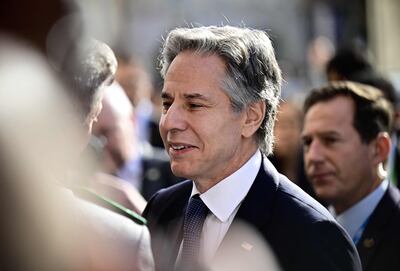Live updates: Follow the latest news on Israel-Gaza
Diplomats have converged on the southern Germany city of Munich in an attempt to make progress towards a ceasefire in Gaza, with high-level meetings between international powers and regional parties scheduled for Friday.
Speaking to get the Munich Security Conference under way, UN leader Antonio Guterres pinpointed the divisions between nations that seek their own gains over collective improvement, rendering the aggressors unaccountable for the damage felt around the world.
He lashed out at the suffering of Gazans and issued a call to stop the bloodshed by halting any plans for an offensive in Rafah. The area holds 1.5 million Gazans, many of whom fled there as Israel invaded after the October 7 attacks by Hamas.
“Nothing can justify the collective punishment of the Palestinian people in Israel’s military response,” he said.
“The situation in Gaza is an appalling indictment of the deadlock in global relations. The level of death and destruction is shocking in itself.
“The war is also spilling over borders across the region and affecting global trade. The humanitarian aid operation is now on life support. It is barely functioning.”
Mr Guterres added that a ceasefire and a return of the hostages taken on October 7 was the only path to scaling up humanitarian aid into the territory.
“Rafah is at the core of the entire humanitarian aid operation,” he said. “An all-out offensive on the city would be devastating for Palestinian civilians who are already on the edge of survival.”
Despite the harsh realities set out at the podium, officials gathered behind a tight security perimeter hope to hold a series of formal and informal talks to purse an understanding that would stop the bloodshed and alleviate the humanitarian crisis.
US Vice President Kamala Harris will also address the deadlock over fighting in Gaza when she speaks in the opening session. Ms Harris is scheduled to meet Iraqi Prime Minister Mohammed Shia Al Sudani and Israel's President Isaac Herzog.
The White House has described Ms Harris' address as a “major foreign policy speech” and comes as the US is heavily engaged in both crises in Ukraine and Gaza, and as concern swirls over an unspecified security threat from Russia that was raised earlier this week by US Representative and House Intelligence chairman Mike Turner.
A meeting between US Secretary of State Antony Blinken and a senior Chinese delegation leader is expected later on Friday. The Munich Security Conference said a similar encounter last year in Munich helped set the stage for talks between Washington and Beijing.
Forum director Christoph Heusgen said the Iranian and Russian governments had not been invited because they had not shown a serious interest in negotiations.
UK Foreign Secretary David Cameron is leading his country's delegation and will be holding regional meetings on Gaza over the course of Friday, before appearing on a panel on global economic security in the evening.

Ukrainian President Volodymyr Zelenskyy is expected to speak at the conference on Saturday after meetings on Friday with Germany and French leaders to sign mutual defence agreements almost two years since the start of the war with Russia.
Experts fear that EU aid alone to Ukraine must double to make up for a shortfall if the US fails to agree to a new round of military aid.
Current aid continues to be provided by a few big donors, including Nordic countries, as well as Germany and the UK, while most past backers have promised little or nothing new.
“This is a challenge, but ultimately a question of political will,” said Christoph Trebesch, research director at the Kiel Institute, a German institute that issued a report on the situation on Friday.
“The EU countries are among the richest in the world and, so far, they have spent not even 1 per cent of their 2021 GDP to support Ukraine.”
The report also noted “a large gap between promised and actual aid flows” from the EU and its member states.

The UN's High Commissioner for Refugees warned that a spillover of refugees from Gaza's Rafah into Egypt's Sinai would be a disaster.
“It would be a disaster for the Palestinians … a disaster for Egypt and a disaster for the future of peace,” Filippo Grandi said on Friday.
The Egyptian authorities had made clear that Palestinians should be assisted inside the enclave and had not asked the UNHCR to discuss possible contingency plans.
“The Egyptians said that people should be assisted inside Gaza and we are working on that,” he added.
Massive security
The three-day meeting is expected to feature more than 180 senior government representatives from all over the world, as well as hundreds of delegates and panellists.
Conference director Mr Heusgen has said that at least a quarter of the 250 people speaking at the 60 events come from the Global South, the highest share to date at the conference.
Munich police are protecting 50 heads of state and government, about 60 foreign ministers and more than 25 defence ministers, among others.
Three major rallies on issues such as Nato, climate change and Ukraine are expected on Saturday. Restrictions on air traffic cover a radius of 5.5km above the city centre, specifically for drone threats.

























